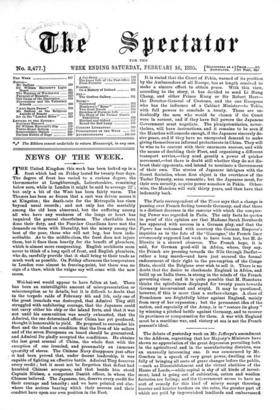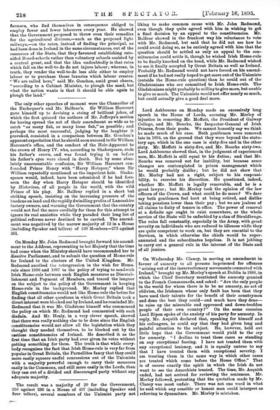The debate of yesterday week on Mr. Jeffreys's amendment to
the Address, regretting that her Majesty's Ministers have shown no appreciation of the great depression prevailing both in the agricultural and in the manufacturing districts, was an unusually interesting one. It was commenced by Mr. Goschen in a speech of very great power, dwelling on the folly of bringing all sorts of grave changes before the public, —such as Disestablishment and the virtual abolition of the House of Lords,—while capital is shy of all kinds of invest- ment, land is going out of cultivation, cotton and woollen factories are failing; and the Government seems to have no sort of remedy for this kind of misery except throwing heavier and heavier burdens on the rates, the greater part of which are paid by impoverished landlords and embarrassed
farmers, who find themselves in consequence obliged to employ fewer and fewer labourers every year. He showed that the Government proposed to throw even their remedies for the agricultural distress,—such as the proposed light railways,—on the rates, instead of finding the principal, as had been done in Ireland in the same circumstances, out of the resources of the State, that they favoured establishing rate- aided Board-schools rather than voluntary schools assisted by a central grant, and that the idea undoubtedly is that rates which fall on the well-to do do not injure labour; whereas, in truth, they render the well-to-do less able either to employ labour or to purchase those luxuries which labour creates.
We are called here," said Mr. Goschen, amid great cheers, "according to a Cabinet Minister, to plough the sand, but what the nation wants is that it should be able again to plough the land."



































 Previous page
Previous page